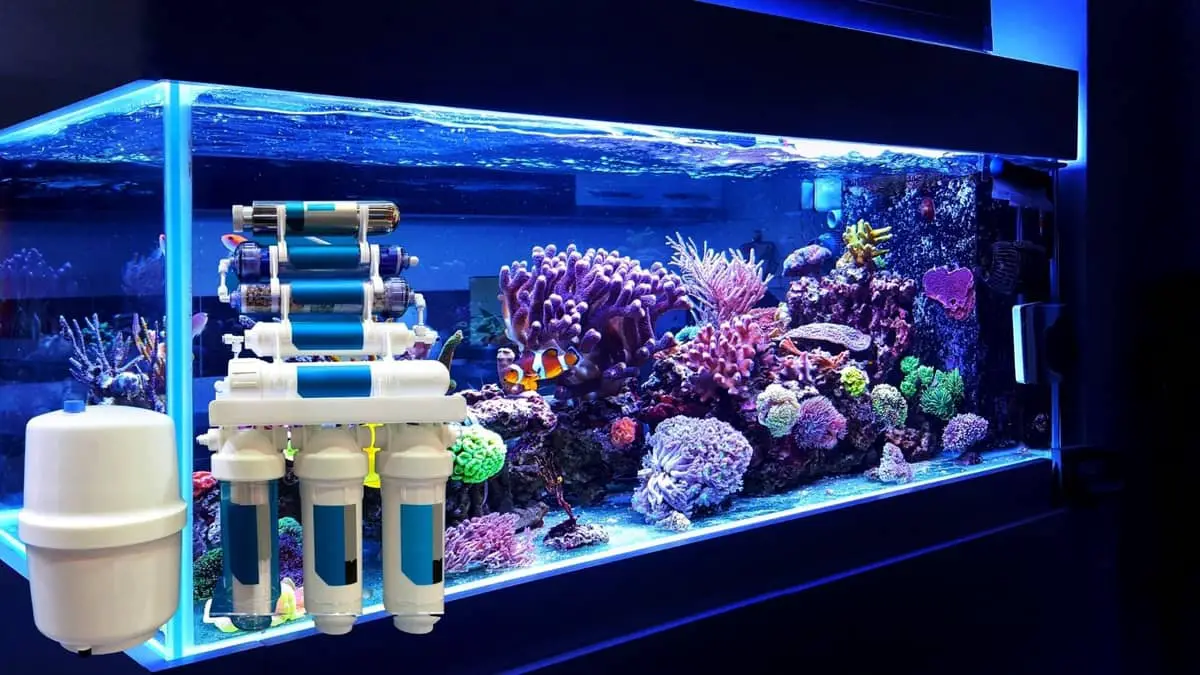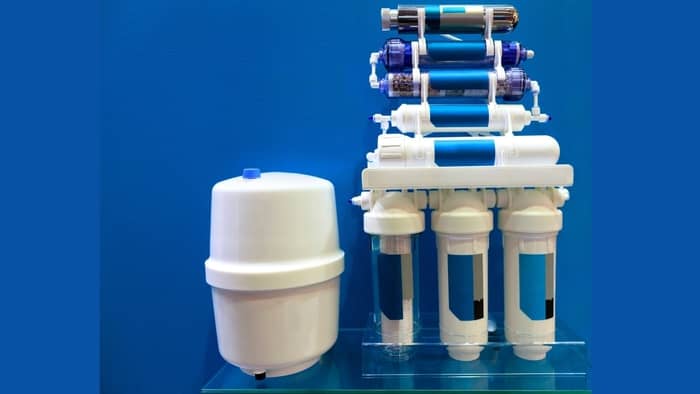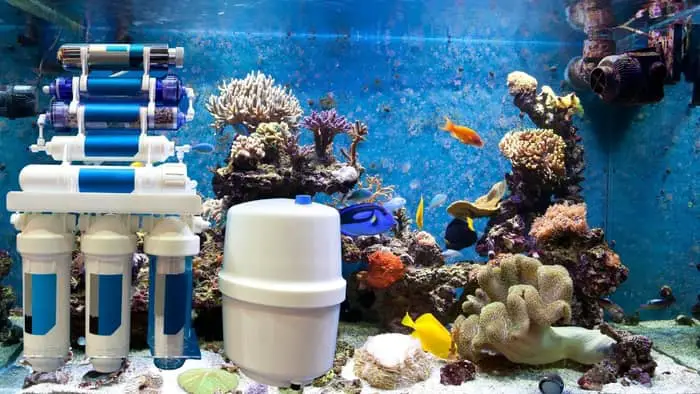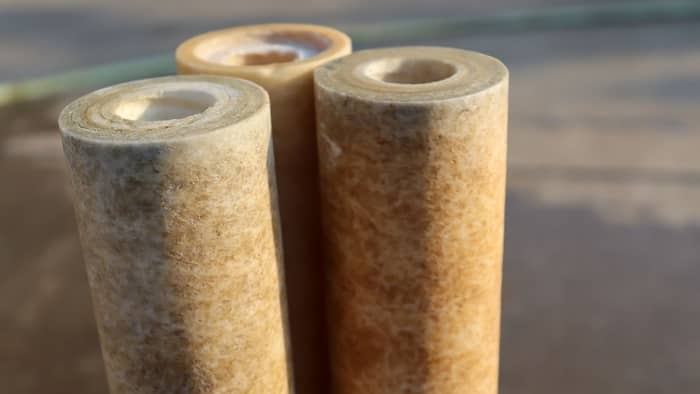Last Updated on March 31, 2022 by admins
A reverse osmosis system for a saltwater aquarium is a great way to keep your tank clean, with very little maintenance.
As complicated and difficult as maintaining a saltwater aquarium can get, it all goes back to basics. Namely, in this hobby, an important condition for life is water. Accordingly, a healthy and thriving saltwater aquarium begins with the purest form of water possible.
Therefore, today we will introduce you to the reverse osmosis system for a saltwater aquarium. Stay with us and find out the answers to all the questions that might interest you.
What Is Reverse Osmosis?
Reverse osmosis is the process of removing contaminants from water when pressure forces it through a semi-permeable membrane. Water flows from the more concentrated side to the less concentrated side of the RO membrane, becoming safe to use, and is called permeate. On the other hand, concentrated water that remains is called waste.
What Are The Parts Of A Reverse Osmosis System?
Membrane
As for the semi-permeable membrane, it is the heart of the entire system. It has small pores that block contaminants but also allow water molecules to flow through. You will need to change the membrane filter cartridges from time to time as the pores fill with various forms of impurities over time. Their longevity depends on water quality. This means that the cleaner the water, the longer the membrane cartridges last, and vice versa.
In the process of reverse osmosis, water becomes more concentrated as it passes through the membrane to obtain equilibrium on both sides. It is important to emphasize that reverse osmosis blocks contaminants from entering the less concentrated side of the membrane.
Prefilter Systems
Since membranes are quite expensive, they need an extra level of protection from having to filter high concentrations of solutes out of your product water. Prefiltration systems that can remove crude particulate matter and solutions will help us here.
Pressure Gauge
The pressure gauge allows the system flow rate to be adjusted to the optimal parameters for the membrane. In addition, it can let you know if you are over-or under-pressuring the system.
Flow Restrictor
A flow restrictor is a type of non-return valve that restricts water flow inbound until the correct internal pressure required for optimal performance is achieved.
Flush Valve
The flush valve allows water to bypass the flow restrictor to allow large deposits to be flushed out of the membrane system again.
Product Water (Output)
Product Water, as its name suggests, produces purified water, and is accordingly able to remove about 90% of unwanted components from tap water.
Wastewater (Output)
Wastewater retains water with all the segregated solutes that you would never want to keep in your tank, such as nitrates, phosphates, metals, pesticides, etc. This type of wastewater can be used for your house plants or plants in your garden or greenhouse.
What Does The Reverse Osmosis System For A Saltwater Aquarium Do?
Using a reverse osmosis system for a saltwater aquarium is extremely important as it has a unique role. Namely, it eliminates fluoride, arsenic, benzene, calcium, sediment, magnesium, chlorine, heavy metals, herbicides, pesticides as well as various types of dissolved organic and inorganic solids.
Unfortunately, we must note that it does not act excessively on the removal of viruses and bacteria. Namely, it removes a smaller portion of the percentage, but bacteria could still grow on the membrane and potentially enter your water supply.
Start with the fact that every successful aquarium must have a solid foundation, and reverse osmosis is one of them. This is the starting point for creating the conditions for progress and thriving. Why? Because even the slightest imbalance can change water parameters, for example, low levels of nitrates can cause algae to bloom and proliferate throughout the aquarium tank. Accordingly, the reverse osmosis system for a saltwater aquarium gives you total control.
Since only a small percentage of people have access to natural seawater, aquarists had to figure out a way to do so. Namely, tap water contains disinfection byproducts and minerals that are not so natural in environments with seawater. On the other hand, adding salt to it can get an approximation of the ocean’s water, but you will never be able to fully replicate it. Therefore, reverse osmosis has proven to be a great way to bring consistency and predictability to this hobby.
In Conclusion
Finally, should you buy a reverse osmosis system for a saltwater aquarium? The answer is simple, if you want to provide your aquatic pets with the best possible water conditions, then, YES!
If you need more information, feel free to let us know in the comments below. We would love to help you!
Also, take a look at this article as well.
FAQs
Do You Need Reverse Osmosis For Saltwater Aquarium?
Absolutely and without a doubt - you should use reverse osmosis for a saltwater aquarium. Only this can guarantee that you will not bring bad things into your aquarium, such as silicates and heavy metals that can cause major problems and introduce an imbalance into the entire system.
How Do I Install A Reverse Osmosis System In My Aquarium?
A reverse osmosis system usually requires only a few minutes to install, after which it is ready for use and water purification. Everything you need to do is quite simple and consists of connecting the tubing to a suitable source water connection, and directing the product and wastewater lines.
Can I Use Reverse Osmosis Water In My Fish Tank?
Yes, you can use reverse osmosis water in your fish tank. Moreover, it is recommended because it is very effective and has many benefits of use. Reverse osmosis is a great way to get rid of contaminants from your aquarium tank, including minerals, chlorine and some larger bacteria.
What Kind Of Water Do You Use In A Saltwater Tank?
It is recommended to use distilled or R/O water in your aquarium tank. In case you can’t get either of the two listed, there are water conditioners that can make tap water suitable for use in saltwater aquarium.



